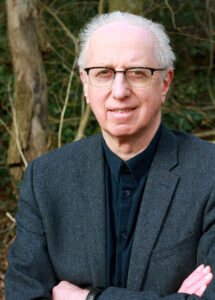A Brief Conversation with Professor Sir Andy Haines, 2022 Tyler Prize Laureate.
September 2022
Sir Andy Haines is the Tyler Prize Laureate for 2022. He is a British epidemiologist and academic with more than thirty years of experience working to understand the impacts of environmental change. He is best known for his work on Planetary Health: looking at the effects of environmental change on human health, and what benefits might exist for both health and the climate when we reduce greenhouse gas emissions. Sir Andy is the Professor of Environmental Change and Public Health at the London School of Hygiene & Tropical Medicine. We spoke to him in London during the 2022 Tyler Prize Award.

Photo Credit: Ken Leeder
What is the relationship between human health and the climate/environment?
For over 2000 years, since Hippocrates wrote ‘Airs, Waters, and Places’, we’ve known that the environment affects human health, but we’ve lost much of that knowledge. Modern medicine often focuses on the use of high technology to diagnose and treat disease and in doing so, sometimes overlooks the vital linkages between the environment and human health. We’re only now realizing the importance of that relationship, not only for us today but also for future generations. This understanding is key to our overarching concept of Planetary Health, which links the state of our natural systems to our health and the health of future generations.
How does the model of Planetary Health differ from traditional public health models?
Public health has traditionally focused on understanding the factors that underpin the health of the population, and it has sought to increase population health – often by reducing health inequities. But it hasn’t really dealt with the environmental foundations of health, nor has it acknowledged how current patterns of development undermine the prospects for health for todays and future generations – by damaging the life support systems of the planet – including from a changing climate and dramatic loss of biodiversity.
Planetary Health seeks to do that by looking at health and environment in a much more comprehensive and integrated way than in the past, by understanding how human health depends on the integrity of natural systems, and how we have to protect those natural systems if we’re going to sustain health into the future.
What does your research show in terms of policy direction?
Our research shows both the risks to populations today, due to the effects of climate and other environmental change, and the future risks we face – which will escalate unless we take action. So, it’s a wake-up call. It’s a warning to humanity that we’re going into dangerous and uncharted territory, and these impacts are beginning to affect us right now.
It also suggests policy solutions for the future. There are two types of policies we’re focussing on: adapting to environmental change, because it can’t all be prevented, and mitigation strategies to cut greenhouse gas emissions into the atmosphere.
Global temperatures are already 1.2ºC above pre-industrial levels, so we have to adapt as far as we can. But at the same time, we can’t just go on emitting greenhouse gases as we are right now, because that makes adaptation increasingly difficult, if not impossible.
So, we have to cut emissions and cut environmental degradation rapidly. In doing so, we will not only reduce the risks of dangerous climate change but also benefit human health in the near term – through reduced air pollution or improved diets, or a number of other pathways. So, it’s that combination of adaptation and mitigation – which I think is really important for policymakers to understand and to put into practice.
How might living in a more environmentally friendly way impact on our health?
This is one area where we have been trying to document the co-benefits. Co-benefits are benefits that are secondary to the main purpose of the policy, which in this instance would be to reduce greenhouse gas emissions.
So, for example, in the case of diet, if we move towards a healthier, more balanced diet with more fruit and vegetables, nuts and seeds, and less red meat – that will reduce greenhouse gas emissions, but also bring with it very large benefits to human health.
Other examples of co-benefits like this include the impact on air pollution if we phase out fossil fuels, which have a major impact on human health. There are many ways in which these policies can benefit human health in the near term and, of course, the environment.
You’re known not only for your research but also for organizing groups of people and pushing for change. What have you learned from your leadership roles?
I’ve been fortunate to have held a number of leadership positions over my career, including as Dean and Director of the London School of Hygiene & Tropical Medicine, and the chair of a number of international initiatives. I think it’s taught me a great deal in terms of harnessing the talents of outstanding colleagues to tackle global challenges and learning from a diverse range of people – because this challenge, the challenge of climate change and Planetary Health, cannot be solved by a single discipline.
A whole host of different people and different disciplines are required, including climate scientists, ecologists, epidemiologists, statisticians, modellers, economists, social scientists and others – together with policymakers and practitioners.
Leadership is about ensuring that people fulfill their potential and making sure that you have the right array of talent and skills that can help to advance a common cause.
September 2022
To read more on Sir Andy’s incredible work:
Video: The Tyler Prize 2022 awarded to Sir Andy Haines
Video: The Climate Crisis: From Impacts to Action – Tyler Prize Laureate Conversation 2022
Follow the Centre on Climate Change & Planetary Health, LSHTM on Twitter: @LSHTM_Planet
